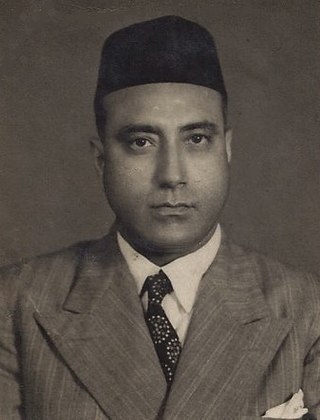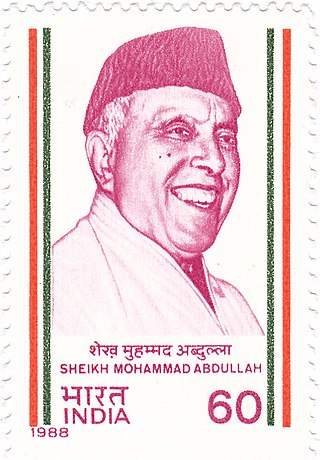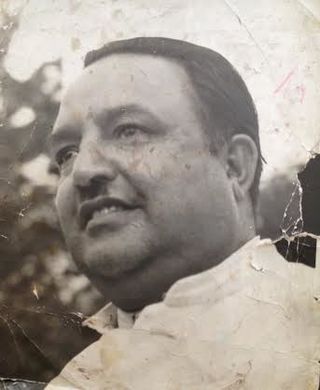Related Research Articles

The Jammu and Kashmir National Conference (JKNC) is a regional political party in Indian-administered Kashmir's union territories of Jammu and Kashmir and Ladakh. Founded as the All Jammu and Kashmir Muslim Conference by Sheikh Abdullah and Chaudhry Ghulam Abbas in 1932 in the princely state of Jammu and Kashmir, the organisation renamed itself to National Conference in 1939 in order to represent all the people of the state. It supported the accession of the princely state to India in 1947. Prior to that, in 1941, a group led by Ghulam Abbas broke off from the National Conference and revived the old Muslim Conference. The revived Muslim Conference supported the accession of the princely state to Pakistan and led the movement for Azad Kashmir.

Ram Chandra Kak was the prime minister of Jammu and Kashmir during 1945–1947. One of the very few Kashmiri Pandits to ever hold that post, Kak had the intractable job of navigating the troubled waters of the transfer of power from British Raj to the independent dominions of India and Pakistan.

Sheikh Mohammad Abdullah was an Indian politician who played a central role in the politics of Jammu and Kashmir. Abdullah was the founding leader of the All Jammu and Kashmir Muslim Conference and the 1st elected Prime Minister of Jammu and Kashmir after its accession to India. He agitated against the rule of the Maharaja Hari Singh and urged self-rule for Kashmir. He is also known as Sher-e-Kashmir.

The Kashmir conflict is a territorial conflict over the Kashmir region, primarily between India and Pakistan, and also between China and India in the northeastern portion of the region. The conflict started after the partition of India in 1947 as both India and Pakistan claimed the entirety of the former princely state of Jammu and Kashmir. It is a dispute over the region that escalated into three wars between India and Pakistan and several other armed skirmishes. India controls approximately 55% of the land area of the region that includes Jammu, the Kashmir Valley, most of Ladakh, the Siachen Glacier, and 70% of its population; Pakistan controls approximately 30% of the land area that includes Azad Kashmir and Gilgit-Baltistan; and China controls the remaining 15% of the land area that includes the Aksai Chin region, the mostly uninhabited Trans-Karakoram Tract, and part of the Demchok sector.
The following is a timeline of the Kashmir conflict, a territorial conflict between India, Pakistan and, to a lesser degree, China. India and Pakistan have been involved in four wars and several border skirmishes over the issue.

Bakshi Ghulam Mohammad was an Indian politician who served as the prime minister of Jammu and Kashmir from 1953 to 1964. Bakshi was a founding member of the National Conference and rose to be the second in command to the principal leader Sheikh Abdullah. He served as the deputy prime minister of the State of Jammu and Kashmir between 1947 and 1953, but disagreed with Abdullah's advocacy of independence for the state in 1953. He staged a 'coup' with the help of the head of state Karan Singh, resulting in the dismissal and imprisonment of Sheikh Abdullah. Bakshi was the longest serving prime minister, whose rule saw the formulation of the constitution of Jammu and Kashmir and a normalisation of relations of Jammu and Kashmir with the Indian government.

Maqbool Bhat' (1938–1984), was a Kashmiri separatist leader, who went to Pakistan and founded the National Liberation Front (NLF), which was a precursor to the present day Jammu Kashmir Liberation Front (JKLF). He is also termed as the "Father of the Nation of Kashmir" Baba-e-Qaum, by the locals. Bhat carried out multiple attacks in Indian-administered Jammu and Kashmir. He was arrested and sentenced to double death sentence. He was hanged on 11 February 1984 in Tihar Jail in Delhi.
The Indira–Sheikh Accord was an accord between Indira Gandhi, the then prime minister of India, and Sheikh Abdullah, leader of the Plebiscite Front. The accord decided the terms under which Abdullah would reenter the politics of Kashmir. It allowed Abdullah to become the chief minister of Jammu and Kashmir again after 22 years and enabled competitive politics in the State.
Mohammad Abbas Ansari was a separatist political leader and a well known Shia Muslim scholar, reformer, preacher and cleric from Indian-administered Jammu and Kashmir. He was known for his religious lectures and as a Kashmiri separatist, ex-chairman of the All Parties Hurriyat Conference, also founder & chairman of the Ittihadul Muslimeen also known as Jammu & Kashmir Ittihadul Muslimeen (JKIM) a Kashmiri nationalist Shia separatist political party which aims for Shi'a–Sunni unity in Kashmir & independence of Jammu and Kashmir from India through peaceful struggle. He is considered a moderate and has called for an end to violence in that region. He is Succeeded by his son Maulana Masroor Abbas Ansari.
Mohammad Yousuf Taing, also known as M. Y. Taing, is a researcher, scholar, critic, writer, politician and historian. He is also biographer of Sheikh Abdullah. He is a prolific literary thinker writing in three Indian languages.
Khwaja Mubarak Shah was a senior Jammu & Kashmir National Conference leader and former Member of The Indian Parliament (MP) from the North Kashmir constituency of Baramulla in the early 1980s and also served as a Deputy Minister in the 1952 Government of Prime Minister Sheikh Mohammad Abdullah. He also served as Superintendent of Police from 1947 for a brief spell and was trained under Gen. Thimaih, and had given up the job to join politics after Sheikh Mohammed Abdullah was made as an interim Administrator to govern the State when its Dogra ruler Maharaja Hari Singh was dethroned in 1947. He was jailed along with Sheikh Mohammad Abdullah and remained in Jail from August 1953 to February 1963, when his father had died. Mubarak Shah polled an overwhelming 67.57% of votes in the Parliamentary Elections in 1980 as opposed to his closest opponent, Muzaffar Hussain Beg who polled 28.48% of total votes polled. He is the son of Khwaja Sikander Shah of Varmul and the Brother-in-Law of Ghulam Ahmad Ashai. He was succeeded as the MP from Baramulla by Saifuddin Soz, who went on to serve as the Union Minister for Water Resources in the first Manmohan Singh Administration.
BP Sharma was a journalist of Jammu and Kashmir, India, who was listed in the Limca Book of Records for becoming the oldest working journalist at the age of 92. He died in 2005 at the age of 97.
The All Jammu and Kashmir Plebiscite Front, or Plebiscite Front, was a political party in the Indian state of Jammu and Kashmir that called for a "popular plebiscite" to decide if the state should remain part of India, join Pakistan or become independent. The patron of the party was Sheikh Abdullah, the former Prime Minister of Jammu and Kashmir and chief of the Jammu and Kashmir National Conference, even though he never formally joined it. The founder of the party was Mirza Afzal Beg.

Mirza Afzal Beg, also known as Fakhr-e-Kashmir was a Kashmiri politician and the founding member of Jammu & Kashmir National Conference. He was the first deputy chief minister of Jammu and Kashmir. He was member of the Constituent Assembly of India. He served as a minister in the pre-independence period in the princely state of Jammu and Kashmir, and as the revenue minister in the post-independence government headed by Sheikh Abdullah. In this post he led the land reforms in Jammu and Kashmir, recognised as the most successful land reforms in India.
Naya Kashmir is the name given to the memorandum that Sheikh Abdullah the leader of Kashmir's leading political party the National Conference submitted to Maharaja Hari Singh the ruler of Jammu and Kashmir State on his return to Kashmir after attending a meeting of the Imperial War Cabinet of Great Britain followed by a tour of Europe and Middle East in 1944. It was the outline of a plan to convert the Jammu and Kashmir state from an absolute monarchy to constitutional democracy with the Maharajah remaining as the Head of the State as the Monarch is in Britain. A detailed economic plan for the development of Jammu and Kashmir State was a part of this memorandum. It was subsequently adopted by the National Conference as its manifesto. The "Naya Kashmir" plan proved to be immensely popular in Kashmir as it was the blueprint for a welfare state far in advance of its times. The text of Naya Kashmir in Urdu language is reprinted in the book "Tehreek e Hurriyat e Kashmir"

Elections for the Indian state of Jammu and Kashmir were held over June 1977, which are generally regarded as the first 'free and fair' elections in the state. Jammu & Kashmir National Conference, newly revived from the former Plebiscite Front, won an overwhelming majority and re-elected Sheikh Abdullah as the Chief Minister.
The first elections for the Legislative Assembly of the Indian state of Jammu and Kashmir under its own Constitution were held in March–June 1957. Bakshi Ghulam Mohammad was appointed Prime Minister of Jammu and Kashmir.
Elections for the Constituent Assembly of the Indian state of Jammu and Kashmir were held in September–October 1951. Sheikh Abdullah was appointed Prime Minister of Jammu and Kashmir. Following frictions with various groups such as the Jammu Praja Parishad agitation, Abdullah was dismissed in August 1953 and imprisoned. Bakshi Ghulam Mohammad was appointed as the next prime minister.
Ghulam Mohi-ud-Din Malik was an Indian politician and advocate, known for his role as the speaker of the Jammu and Kashmir Legislative Assembly from 1977 to 1981. He was a member of the Jammu and Kashmir National Conference (NC).
References
- ↑ Perspectives on Kashmir: the roots of conflict in South Asia by Raju G. C. Thomas
- ↑ "NDTV.com: Kashmir the bone of contention". www.ndtv.com. Archived from the original on 8 October 2012.
- 1 2 3 The activities of the Plebiscite Front eventually led to the institution of the ‘Kashmir Conspiracy Case’ in 1958 and two other cases Having put Abdullah behind bars on 8 August in "Kashmir conspiracy case"
- ↑ The Kashmir conspiracy case
- 1 2 3 4 5 6 "Kashmir Conspiracy Case". Archived from the original on 18 September 2011. Retrieved 14 September 2011.
- 1 2 3 The clash of fundamentalisms: crusades, jihads and modernity By Tariq Ali, page 239
- ↑ Sheikh Abdullah; M.Y.Taing (1985), p593-594
- ↑ Sheikh Abdullah; M.Y.Taing (1985), p607
- ↑ Sheikh Abdullah; M.Y.Taing (1985), p600
- ↑ Sheikh Abdullah; M.Y.Taing (1985), p711-717
- ↑ Link, Volume 6, Issues 26-52, 1964